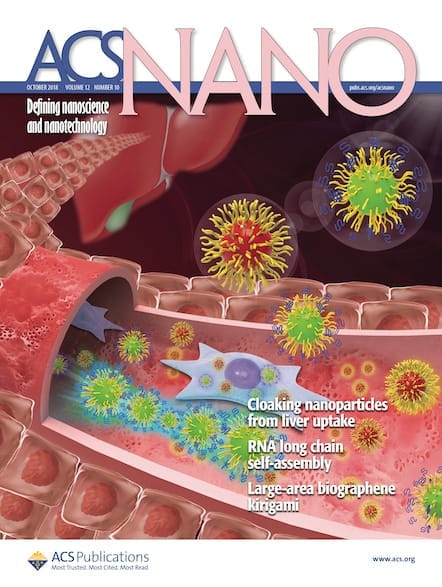ACS Publications is delighted to introduce Xiaodong Chen, Ph.D., as the new Editor-in-Chief of ACS Nano. Professor Chen is the President’s Chair Professor in Materials Science and Engineering, and Professor of Chemistry and Professor of Medicine by courtesy, at Nanyang Technological University in Singapore. He holds a joint appointment as the scientific director and principal […]

ACS Publications is delighted to introduce Xiaodong Chen, Ph.D., as the new Editor-in-Chief of ACS Nano.
Professor Chen is the President’s Chair Professor in Materials Science and Engineering, and Professor of Chemistry and Professor of Medicine by courtesy, at Nanyang Technological University in Singapore. He holds a joint appointment as the scientific director and principal scientist at the Institute of Materials Research and Engineering, Agency for Science, Technology and Research. Chen serves on the editorial advisory boards of more than 10 journals including ACS Nano, ACS Applied Bio Materials, and Advanced Materials, and is an Associate Editor of ACS Materials Letters. He received his Ph.D. in chemistry from the University of Münster in Germany.
“ACS Nano is renowned in the nanoscience and nanotechnology research community, and as editor-in-chief, I will be interested in how the journal can itself display the impact that nanoscience and nanotechnology research has on society,” says Chen. “The research described in ACS Nano has the potential to transform pressing issues facing society, helping to provide solutions to unmet challenges in sustainability, healthcare, and security. I look forward to leading ACS Nano to increase its global leadership and influence.”
Learn more about Professor Chen in this interview, and read about his vision for ACS Nano in his first Editorial.
What initially attracted you to your field?
By specializing in chemistry and materials science, I can pursue the limitless potential of creating positive impacts of nanoscience and nanotechnology in sustainability development, healthcare, advanced manufacturing industries, and more.
This field can complement other interdisciplinary academic fields such as electrical engineering, bioengineering, and data science to advance fundamental research and resolve real-world issues with solutions beyond the scope of a single research discipline.
What are you most excited about as you begin work with ACS Nano?
It is most exhilarating to join ACS Nano and connect the dots while extending our global reach with community engagement of leading experts to discuss new research and promote collaboration for applied contributions of nanoscience and nanotechnology, striving to meet the pace and pressing demands for our future.
What do you think are the major challenges facing nanoscience and nanotechnology today?
Nanotechnology is an interdisciplinary field that directly relates to chemistry, physics, mechanical engineering, physics, bioengineering, and chemical engineering to shape a range of disciplines that evaluate material properties at the nano-level. In this era of scientific and technological boom, nanotechnology is one of the sophisticated technologies that created a series of technological advances. Without a doubt, there are some challenges regarding its applications.
Major challenges of nanoscience and nanotechnology persist today when researchers attempt to control or manipulate the matter on an atomic scale to direct them to the target application and the inability to predict the results of changing molecules/materials which may imply the emergence of the potentially undesirable outcome. Thus, this technology is also experiencing some difficulties due to fear and controversy, fearing its impact on the future.
What do you think is the most interesting and/or important unsolved problem in your field?
The most crucial unsolved problem we are facing today is improving our health and well-being. Especially in the face of unprecedented challenges from the COVID-19 pandemic and population aging that put great emphasis on new drug/vaccine creation and innovative engineering techniques to deliver healthcare for quality living.
In the same line of thought, the most crucial unsolved problem in my field would be how to extend the quality of life by scaling digital health innovation. We have already seen that as the average age increases, neurodegenerative diseases are also on the rise and heavier chronic disease burdens. Living a healthy life for as long as possible outweighs the importance of simply living longer. By exploring technological tools and data in precision healthcare, we could support processes that underpin life. Such include delivering innovative solutions with enhanced sensory capabilities that benefit digital healthcare applications, including robotics, wearables for continuous health monitoring, advanced prosthetics, sensation restoration, impression construction, psychodiagnostic, nanotherapeutics, etc.
With my group, we are developing soft and adhesive materials for implementing conformal bioelectronic interfaces in skin-like sensors. This area enables the further extension of biological senses and reconstruction of “new senses” (or restoration) by fusing conformal sensing technology with artificial intelligence and neuromorphic computing, which performs brain-like perception of the obtained high-quality data. I hope my technological inventions can one day empower digital healthcare, environmental sensing, and extend/mimic human senses for the next-generation intelligent systems for robotics and neuroprosthetics.
What advice would you give people who want to pursue a career in science? If you had to start over again, what advice would you give yourself?
The road to a successful career in science can be challenging. Scientists and researchers using science to create something new may produce novel materials with no previously known characteristics that can unlock many areas in front of humans to uncover materials or technology that can contribute to the development and service of humanity. Besides cultivating a keen and innovative mind, one needs to build resilience to overcome challenges to be adaptable to the ever-changing demands of this field.
If to start over again, I would advise myself to keep pushing the boundaries of the emerging scientific field to create a positive impact by continuously deploying technologies into real-world applications that potentially derive solutions to global challenges.
